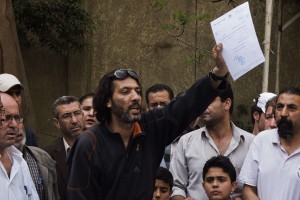
(AFP File Photo)
Out of 1,500 refugees from Syria who were detained in Egypt, around 300 remain arbitrarily detained as of 4 November, a report released by Human Rights Watch (HRW) on Monday said.
The other 1,200 “have been coerced to depart, including dozens who have returned to Syria,” the report said, adding that “security forces continue to make arrests,” some of which were made as recently as 4 November.
Mohamed Farouk, a lawyer who has handled cases of refugees from Syria with the Arab Network for Human Rights Information, said that a large number of the arrests were random. He added that these arrests came after a media report surfaced after the ouster of former President Mohamed Morsi accusing Syrians of supporting the Muslim Brotherhood and taking part in their sit-ins.
Saleh Mohamed, an Egyptian who is part of Refugees’ Solidarity Movement which tries to stop violations and deportations of refugees, said that after the ouster of Morsi, some members of society started rejecting Syrians. This and the random arrests have left many Syrians believing that their best option is to leave illegally and enter Italy by boat. “Some make it, others drown,” Mohamed said.
The HRW report stated that most of the 1,500 who were arrested had been trying to migrate this way at the time of their arrest.
But other than a less accepting society, the ouster of Morsi was followed by legal hindrances in the face of refugees coming from Syria and those who were already in Egypt. The HRW report said: “Since 8 July, when the government imposed restrictions on their entry to Egypt, Syrians have had to acquire visas and security clearance in advance to enter.”
Farouk says the policy applied to Syrian refugees during Morsi’s time in office allowed Syrians to stay without renewing residency permits, which many therefore opted out of. However, this policy was never adopted as an official decision and “the legal time for renewal is over. If someone goes to renew their residence, they will get deported,” he said.
Mohamed meanwhile said many people whose residence permits have expired are afraid of going to get them renewed, lest they be detained or deported in the process.
Farouk believes the Egyptian government must announce a grace period in order for refugees to renew their residencies, since the majority of those arrested and found without permits are deported.
While the Egyptian Foreign Ministry says the number of Syrian refugees in Egypt is 300,000, the United Nations High Commissioners for Refugees (UNHCR) said there are over 126,000 persons of concern. Farouk said those who were issued yellow cards by the UN Refugee agency do not face trouble, a view also held by the UNHCR, which said that refugees applying for the yellow card receive it on the same day.
However, Farouk believes that the agency can do more since the UNHCR only comes into the picture after the refugees are arrested.
Once arrested, Mohamed said, the most common form of assistance the detained refugees receive is through plane tickets, rather than attempts to release them from custody.
Typically, the refugees were charged with illegal immigration. HRW documented two dozen cases in which charges were dropped, and the HRW report cites 615 cases represented by the Egyptian Centre for Social and Economic Rights, in which the charges were also dropped and prosecution ordered the detainees’ release.
“Instead of releasing the refugees, police took them to police stations and held them under orders from National Security to detain them until they left the country,” the HRW report said.
HRW cites UNHCR as saying that fewer than 10% of the detained refugees are ever released into the community.
In addition to being held, HRW said authorities pressured detainees to sign declarations saying they are voluntarily leaving the country, threatening indefinite detention if they do not sign. HRW said that every refugee who was interviewed said they were told by the police that they would remain in detention until they collected enough money to buy plane tickets to leave Egypt.
The Ministry of Interior was unavailable for comment.
HRW called for the release of the refugees held without charges, the investigation of the circumstances surrounding their arbitrary detention, and compensate for those who were arbitrarily detained.
While the majority of refugees coming from Syria are Syrians, there are also 6,000 Palestinians who fled the Syrian crisis and came to Egypt. However, the Egyptian Foreign Ministry has not authorised refugee registration with the UNHCR, citing that such persons fall under the mandate of the United Nations Relief and Works Agency (UNRWA).
HRW said the UNRWA’s area of operation includes Jordan, Lebanon, Gaza Strip, West Bank and Syria, but not Egypt, and urged Egyptian authorities to allow the UNHCR to bring Palestinians from Syria under its protection mandate. As of now, the UNHCR can only advise and assist them.
“Syrians and Palestine refugees, who had their former habitual residence in Syria, require international protection,” HRW said. The main options for Syrians in Egypt are to travel onward to Lebanon, Jordan or Turkey.
But this does not apply to Palestinians from Syria, whose only option is to go to Lebanon, where they are allowed to stay for 48 hours before having to return to Syria.
The Ministry of Foreign Affairs did not return a call for comment but Foreign Ministry spokesperson Badr Abdelatty had said last October that Syrian refugees in Egypt are treated “in a dignified way … and receive the same treatment as Egyptians in regards to health care and education.” He denied any mistreatment of Syrian refugees in response to an Amnesty International report detailing the detention and deportation of refugees.
A report by the Egyptian Centre for Social and Economic Rights, released on 5 October, detailed the “extremely bad conditions” in which Syrian refugees were being detained.

